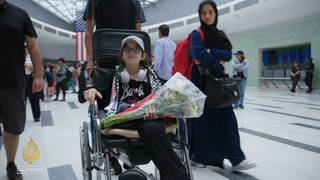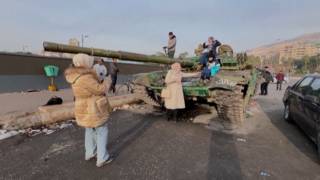
Related
Topics
Guests
- Amira Hasscorrespondent for the Israeli newspaper Haaretz and one of Israel’s leading journalists. She has spent much of the last decade living in Palestinian communities of the Gaza Strip and the West Bank. Hamas recently told her to leave Gaza. She joins us on the phone from Ramallah.
Israel has imposed a tightened blockade over its million-and-a-half residents for nearly a month. Last month, award-winning Israeli journalist Amira Hass defied the blockade and entered Gaza on a boat with international peace activists. But on Sunday, Hamas officials told Hass they could no longer guarantee her security and forced her to leave. Hass was briefly detained by Israeli security officials upon reentering Israel Monday, because she did not have a permit for Gaza. Amira Hass joins us on the phone from Ramallah. [includes rush transcript]
Transcript
AMY GOODMAN: We turn now to the Middle East, to the Gaza Strip, where Israel has imposed a tightened blockade over its million-and-a-half residents for nearly a month. The Israeli navy blocked a Libyan ship carrying 3,000 tons of food and medical aid from entering Gaza on Monday. It was the first attempt by a foreign government to break the siege of Gaza.
Last month, award-winning Israeli journalist Amira Hass defied the blockade and entered Gaza on a boat with international peace activists. She reported for the Israeli newspaper Haaretz from Gaza while being accompanied by Hamas. But on Sunday, Hamas officials told Amira Hass they would no longer guarantee her security and told her to leave. Hass was briefly detained by Israeli security officials upon reentering Israel Monday, because she didn’t have a permit for Gaza. The Israeli army officially barred its journalists from entering Gaza after the 2006 kidnapping of the Israeli soldier Gilad Shalit.
Amira Hass is a correspondent for Haaretz. She’s the author of Drinking the Sea at Gaza: Days and Nights in a Land Under Siege. She joins me now on the telephone from Ramallah, the West Bank, where she lives.
Welcome to Democracy Now!, Amira.
AMIRA HASS: Hi, Amy.
AMY GOODMAN: Tell us what happened to you in Gaza. Why were you kicked out by Hamas?
AMIRA HASS: I don’t know. They just got tired of me, I guess, because they insisted from the start to follow me, to escort me twenty-four hours a day, which, of course, didn’t make my work very easy, but I took it OK. They said there is a — “We want to avoid any — the slightest chance that somebody might hurt you.” And then, all of a sudden on Sunday, they told me that the circumstances have changed, and there is more tension in the region, and there are all sorts of information — there is all sorts of information that my life might be in danger. And as a principle, I don’t take such, you know, at face value what any security apparatus tells me, whether it is the Israelis, whether Arafat or Hamas. But they left no option. I mean, they were very strict about it. I have some friends in Hamas. They tried very hard to put sense into some people, but it was in vain.
And the only thing we managed is to postpone the decision by one — less than a day, so that I could also see friends of mine, because the main sense that I have, that Gaza is going to be isolated for so many years and that people will not be able to leave anywhere, not to the West Bank, not abroad, not for a vacation, for so many years, that who knows when I see friends again? So that was also a very — apart from the frustration, the professional frustration, that I felt, you know, I planned to stay three months now in Gaza, so there is so much more to do.
AMY GOODMAN: Amira Hass, describe life in Gaza right now. I mean, it’s very hard to get information out. In the last few weeks, executives from the New York Times, from Associated Press, Reuters, CNN, BBC and other news organizations sent a letter to the Israeli Prime Minister Olmert, saying — well, criticizing the government’s decision to bar journalists from entering Gaza, with Israel virtually sealing it off. It’s very hard to get a picture of what’s going on inside.
AMIRA HASS: Yeah, and it’s even very hard to describe it even in ten minutes or thirty minutes. It’s complete isolation. I feel it’s like a black hole. Everybody — this isolation, this blockade, reduces people’s lives into basic [inaudible], you know, concerns. Will there be electricity? Will there be water? Will we find candles in the shop? Is there gas for cooking? People are still offended by the very needs to be preoccupied all the time by those needs.
At the same time, there is a lot — as always, there is the spirit of defiance that you find among Gazans and the ability to make humor. So this has not been lost at all. And actually, I was upset with some of the reports that only focused on how Palestinians are miserable, Gazans are miserable, and completely overlooked the ability to [inaudible] and the creative abilities of Gazans.
So you have the — then you have a blockade also imposed on Gaza on the part of the Palestinian Authority. They still hope to make Hamas government collapse by obstructing the regular work of main ministries in Gaza, Education and Health. And this is very — this is really nasty. It’s a chance for Hamas to employ its own people, but its own people, especially in health, are less — are very much less experienced, so there is a problem with the health system. There has always been, but it’s now deteriorating very fast. The same is true about the education system.
It’s really heartbreaking to see how it’s not only the blockade, it’s not only the siege. And the siege, as you remember, started in ’91 and not just four months ago. It’s an ongoing process. It’s an Israeli policy. But this Ramallah authorities that the Palestinian Authority adds to it, adds to it its pressure. This is very — and people are — it doesn’t weaken Hamas. On the contrary, people say, “OK, so Hamas is one of us. We are all targeted both by Israel and the Palestinian Authority.”
And the third point is that Hamas is not unhappy with the isolation right now, because it enables it to establish its own regime in this small part of the world and a bit — and kind of independent from Israeli — a strange as it may sound — far away from Israeli control. OK, there are attacks, military attacks, but inside, it’s much more free from Israeli interference than the West Bank. So they can experiment their Islamic rule there, even though they say all the time this is not their goal. But in practice, this is what is happening.
So what is happening, that you have this miserable enclave with people who are imprisoned in it for so long and who are yearning for the world to open for them, for studies, for travels, for books. Books, you know, I mean, it’s difficult to send books to Gaza. It’s almost impossible. UNRWA has in its list some hundreds — about a few thousands of books that UNRWA is waiting to bring into one of its libraries. And it cannot because of Israeli restrictions. So — but somehow, the three parties, the three powers concerned, as unequal as they are, participate in this growing isolation of Gaza.
AMY GOODMAN: Let me ask you, Amira Hass, let me ask you, in the protest of the news organizations to being banned from Gaza, an Israeli Defense Ministry spokesperson said that they were displeased with international media coverage, because it inflated Palestinian suffering, it didn’t make clear that Israel’s measures are in response to Palestinian violence.
AMIRA HASS: Yeah. Should I comment?
AMY GOODMAN: Yes.
AMIRA HASS: Look, Israeli officials have the talent always to reverse everything. I mean, it’s the occupation that starts. I mean, it’s — that’s the first thing. I mean, it’s Israeli policies of occupation which are the beginning. And then everything is a response, Palestinian response. Whether it’s clever or not, it’s a different question. But I’ve never — I mean, it’s really amazing that they dare — I mean, this has not — this has never been given as a reason to prevent journalists from entering Gaza. I mean, it seems that they are really passing their own borders or red lines, that they don’t — they used to say, “OK, there is a danger to your life.” But now they’re even there to say to intervene in the content of your report. And besides, it’s not true, because I think that the world knows much more about Sderot, the Israeli city which suffers from attacks of Palestinian rockets, than they know the names like Bani Suhaila or Beit Hanoun or Abasan [inaudible], that were localities in Gaza which have almost daily incursions. So, these names are not known in the world. So it’s not even true what he claims.
AMY GOODMAN: And I wanted to ask about the statement of, well, the lame-duck Israeli Prime Minister Ehud Olmert, who recently said, to the surprise of many, that he felt that Israel should withdraw from the territories. And I wanted to get to you his exact quote. He said that “We are gravely concerned about the prolonged and unprecedented denial of access in the Gaza for the international media” [sic.]. But he also talked about —
AMIRA HASS: [inaudible] Olmert? [inaudible]
AMY GOODMAN: He said that Israel should withdraw from nearly all territory captured in the 1967 Middle East war in return for peace with the Palestinians and Syria. He said, “I’m saying what no previous Israeli leader has ever said: We should withdraw from almost all the territories, including in East Jerusalem and in the Golan Heights.” Well, he still is prime minister.
AMIRA HASS: Yeah. This is — I mean, this is ridiculous. I mean, if you are, why won’t you do it now? I mean, where were you five months ago or a year ago? And it’s probably not a new thinking. So you could say, oh, great, that he’s been influenced a bit and got sense. But this is — it’s useless. So, I don’t know what made him say that, but it’s totally useless if you don’t — if it’s not your policy, if it’s only words.
AMY GOODMAN: Why can’t he? Even as a lame-duck prime minister, why can’t he enforce it, why can’t he move in that direction, since he’s already said this?
AMIRA HASS: OK, [inaudible], you know, that he’s created this monster of the settlement — settlers who oppose to any such idea that — and they created this tradition that you don’t touch the settlers when the object to any legal action against them, that of course he could not even start it in the few months that he has or one month that he has ’til he has to leave. This is not realistic right now.
The question is, where did he start to change his mind? Where did he think that ’67, return to ’67, is the only solution? Three months ago or three years ago? And why didn’t he do it before? So does he want to gain some popularity now that he’s lost so much because of all the scandals, popularity among certain echelons in the society? I do not know. I mean, it’s a riddle.
But, of course, he cannot do it, because not only that, it’s because right now Israeli society is profiting directly from the occupation, more than ever before. And this one of the achievements of the Oslo agreement and the Oslo process, that the settlements could extend direct economical company —- economical companies that are directly connected to the settlements and to the Occupied Territories has grown. More Israelis see the settlements as a natural entity, natural phenomenon. And also, in the popular mind, Palestinians have a state. Doesn’t matter that it has no sovereignty, no land, no water, no borders. But in the mind of Israelis, Palestinians have a state, because they’re in control of their administrative affairs. So -—
AMY GOODMAN: Amira Hass —
AMIRA HASS: — even if he wanted now, he could not, because the general sentiment in Israel now is very — since the whole situation of occupation is something normal.
AMY GOODMAN: We’re going to have to leave it there. I want to thank you for being with us. Are you going to go to court on Thursday, in an Israeli court?
AMIRA HASS: It’s only procedural for, because I was released on bail. I was arrested, and then Haaretz worked hard so that I would not be sent to jail for one night. And so, now we have to discuss the terms of my release. And then they say that they might charge me with breaking the military — the commander’s order. But we shall see.
AMY GOODMAN: Well, we’ll keep people posted. Amira Hass, correspondent for the Israeli newspaper Haaretz, she’s talking to us from Ramallah, from her home in the West Bank. She was kicked out of Gaza.
This is Democracy Now!, democracynow.org, the War and Peace Report. And the quote before, “We’re gravely concerned about the prolonged and unprecedented denial of access to the Gaza Strip for the international media” was from the news executives complaining to the Israeli Prime Minister Ehud Olmert.












Media Options